Student Blog
International
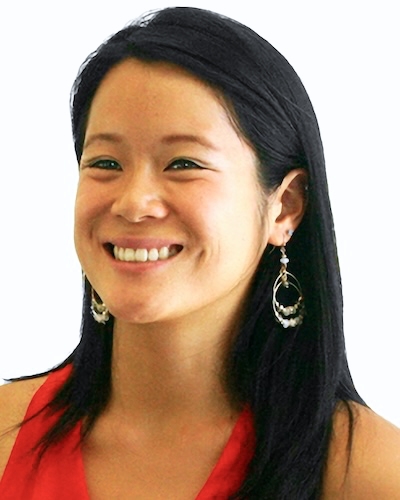
Snow Before Sun ⟩
March 2, 2014, by Clarissa
Externships International School/Life Balance
I’m about to embark on my leadership externship in Ghana where it’ll be over 90 degrees every day. I’m going from one extreme to the other because right before the trip, the socials chairs, which includes myself and a first year, of the Occupational Therapy and Science Council planned a cabin trip up in Big Bear for the OT program!
Getting there was quite the ordeal — it’s usually a 1.5 hour drive but it took my car 8 whole hours to get there. We got caught in a snow storm! So the traveling was stressful but it was worth it because, when we woke up the next morning, there was fresh, powdery snow everywhere for us to play in.
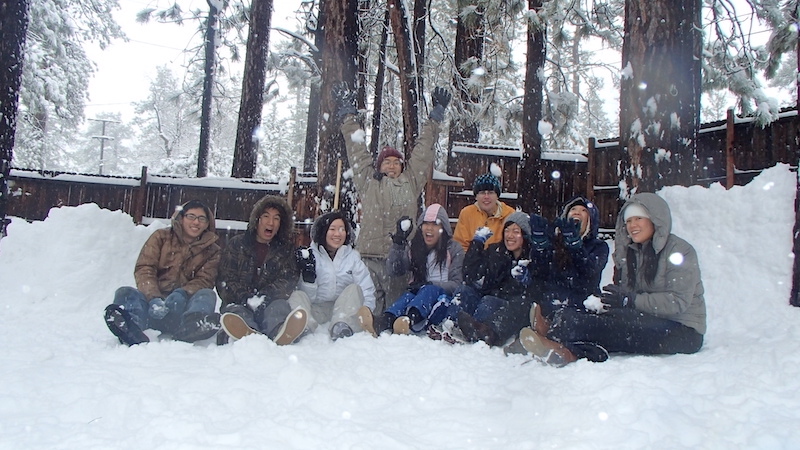
It was so fun building forts and having snowball fights with one another! We also cooked, watched movies, took walks to Big Bear Lake, and just talked in our down time. Being in a house together for 2 whole days was optimal for bonding time, which I LOVE.
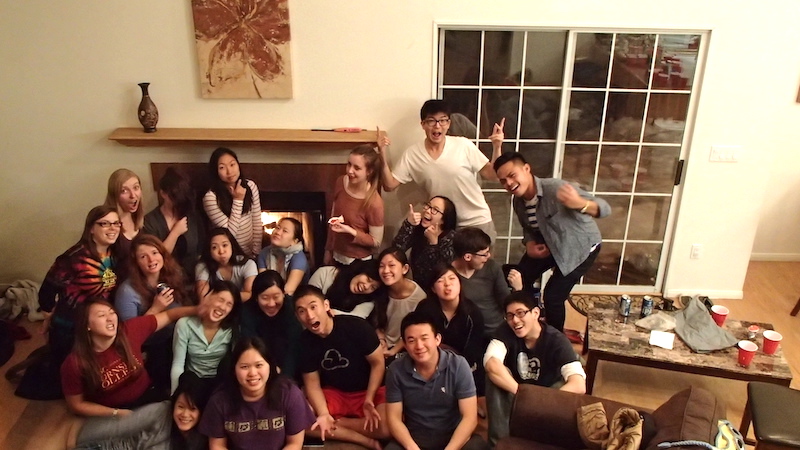
It was a great trip and I’m looking forward to the next big one coming one — Ghana! In the meantime, I’m going to stress out because I haven’t packed at all.
⋯

Gearing Up For Ghana! ⟩
February 19, 2014, by Kate
Externships International
As I may have mentioned, I will be going to Ghana for my Leadership Externship, alongside about 30 of my classmates and 10 occupational therapists/professors. I’ve known since last November that I was going on this journey, but it is so crazy to me that I will be leaving exactly 2 weeks from today! There have been many items on our “TO DO” list that I have accomplished just in the nick of time; there are also many items on that list that I still need to conquer! Today I bought my insect repellent in order to fend off the mosquitoes, a couple bandannas to help with the dust, and all-important sunscreen. I still need to purchase materials for my activities with the students and get my school materials together for when I am there. I will be able to journal each day to reflect on my experiences, and I bought a camera for pictures and video. I’m so excited for this journey and to learn more about myself and my own capacities as a future clinician. I can’t wait to come back after my 3 week trip (Ghana in 2 weeks and then Spring Break for a week in Germany) and share all about my experiences. My fellow ambassador, Clarissa, will also be on the trip, so I’m sure between the two of us, we will have MANY pictures and stories. HOORAY!
⋯
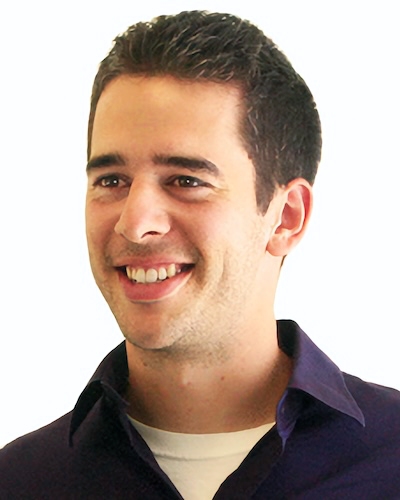
Spring is in the air ⟩
January 21, 2014, by Rob
Classes Externships International Living in LA
Spring is in the air. Not just Spring semester, but the feel of Spring. An unseasonable warm period has flowers blooming, students wearing shorts, and the ants at my house on the prowl. If you live anywhere east of California, I’m sorry. I know it’s cold. My parents in Chicago sent me pictures from when the daily high was not getting above 0 degrees. That’s not normal even for Chicago.
I’ll tell you, it makes me even happier to be in southern California!
Spring is in the air. In a few short weeks, I will be leaving for Ireland for our Leadership Externship. The experience is a student-organized two-week externship, which means it can be whatever you want it to be. Some of us are going internationally and many more are staying within the United States. For me, I wanted to get more education experience and see how occupational therapy and disability are taught in another country. I’m going to be at the University College Cork for the two weeks and then I’ll have part of Spring Break to explore the country on my own.
Plus, they have a juggling team!
Our final semester is focused on electives, giving students a chance to focus on one or several areas that they find interesting. I have three general areas of interest: education, disability studies, and older adults. For the first two, I’m working on independent studies focused on teaching pedagogy and disability education in occupational therapy. My other electives are Universal Design and a course on housing and older adults through the Davis School of Gerontology.
All in all, it promises to be a fun semester.
⋯

A global reach ⟩
October 24, 2013, by Rob
Community International
Occupational therapy is a profession practiced worldwide, with 80 different nations represented in our global association, the World Federation of Occupational Therapists. USC has embraced the global nature of the profession with the MA-I program, which offers a one-year master’s degree to practicing clinicians, both from the United States and internationally.
I recently received a picture from my friend Toshi, who came from Japan last year to do his MA-I at USC. After finishing the program, he returned to Kyoto, where he works in the sub-acute care sector of adult rehabilitation. I’ve attached his picture at the bottom and I’m glad to see our buttons proudly displayed in his work space!
The opportunity to integrate with practitioners from other countries is of great value to us as students. Being exposed to a broader perspective on occupational therapy continues to challenge us to keep an open mind when it comes to our expectations on what OT should look like. And we get to meet interesting people from a variety of backgrounds and expand our interconnected network of OTs across the world.
Toshi, you may be across the world from us, but you will never be far from our hearts!
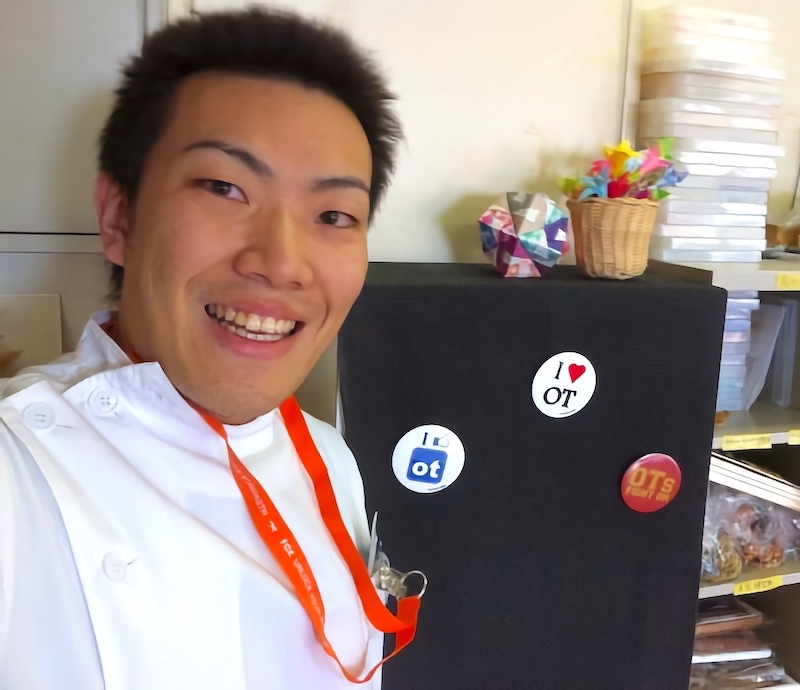
⋯

Externship in Thailand ⟩
April 3, 2013, by Alisa
Externships International School/Life Balance
I can’t believe I got a rare opportunity to spend 3 weeks in Thailand. Of course, I took it and ran with it. 2 weeks of externship and a week of spring break. The goal of the externship was to learn leadership skills, so I reached out to my aunt who is the owner of Sammie and Sandy Beauty Spa and the chairperson of a non-profit organization, Zonta International (Bangkok 7 region). Some of the highlights of my externship were that I got to table a booth for my aunt’s company at the Bangkok International Hair Show and a golf course. Those were two different populations, but I had to utilize my people skills to engage potential customers in our services and products. It was a tough crowd I have to say, but it was still a valuable experience. Zonta International had a Rose Day, where all of the regions met up to represent different ASEAN countries. I got to dress up in Thai traditional clothing and networked with the members through an evening of great food and music while learning about ASEAN countries and potential business opportunities there.
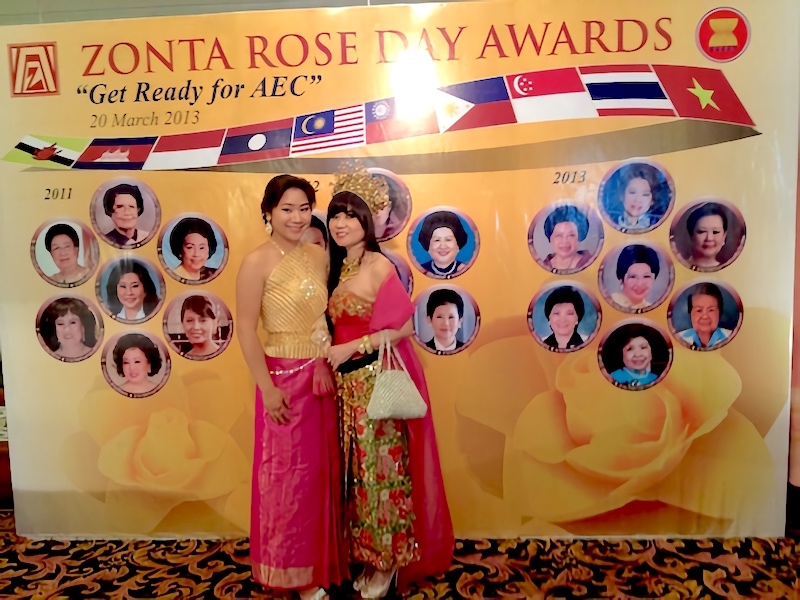
⋯





